Eight Thousand Years in a Bottle: Harvesting Grapes Where Wine Was First Fermented
Joining Rtveli, the annual autumn grape harvest in Georgia, transported me back to the origins of winemaking
📍 Kakheti, Georgia
In Kakheti, the heart of Georgia's winemaking region, viniculture is more than a profession — it is a lineage that stretches back 8,000 years. This isn’t just an archaeological theory; it’s a living tradition. Georgians continue to harvest, ferment, and imbibe using techniques passed down from their ancestors, preserving an unbroken connection to the world’s first winemakers. The word "wine" itself is thought to have roots in the Georgian "gvino," which influenced the French "vin," Spanish "vino," and English "wine." Georgia, it seems, not only pioneered winemaking but also shaped the very language used to describe it.
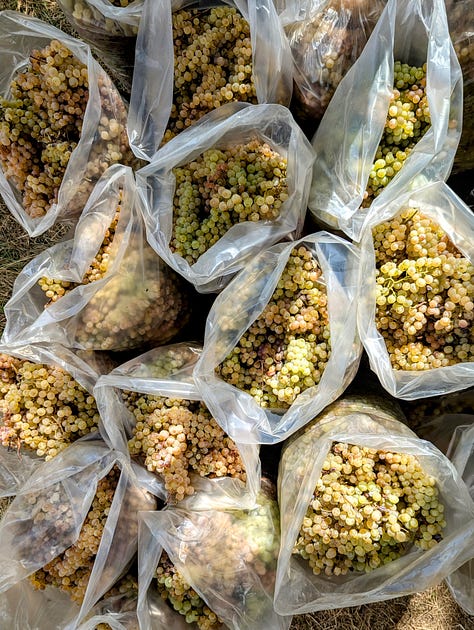

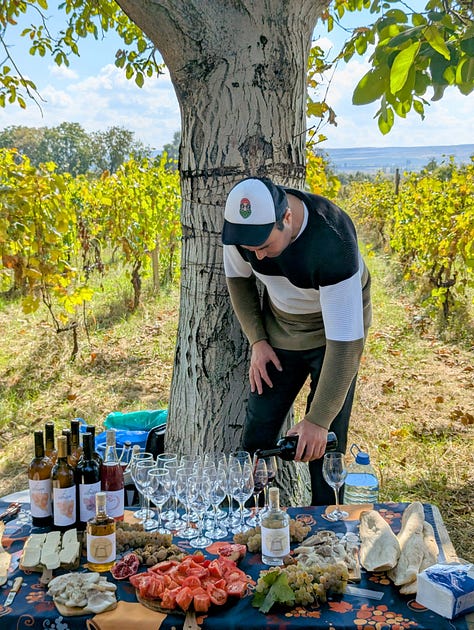
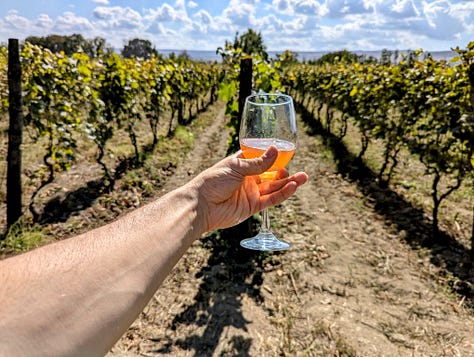
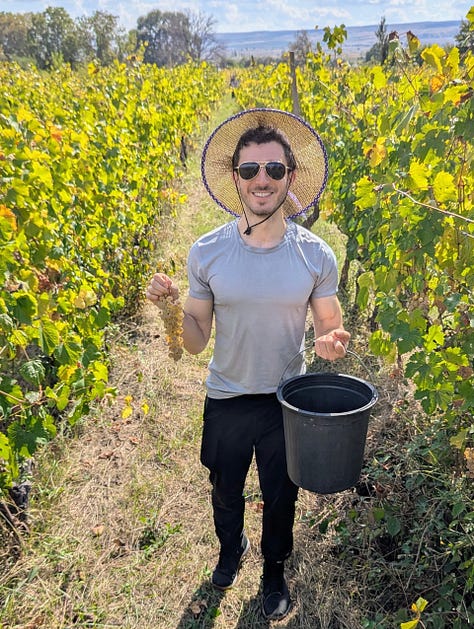
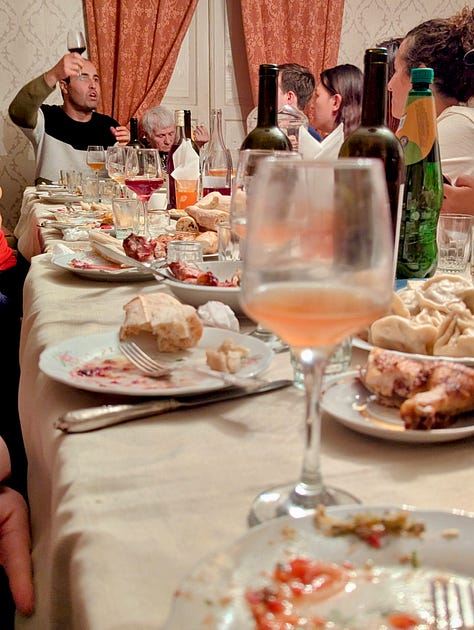
I arrived in Kakheti during Gvinobistve, "the month of wine," just in time for Rtveli, the grape harvest festival. Rtveli is not merely an agricultural task but a communion with history, the land, and each other. Nothing is artificial, wasted, or changed from when humans first fermented grapes into wine. Unlike European winemakers, who typically ferment only the juice, Georgians use the entire grape — skins, seeds, and even stems. This approach adds tannins and minerals, natural preservatives that allow Georgian wine to last twice as long as its European counterparts.
Harvesting a Georgian family's vineyard during Rtveli, with everything — from seed to stem — destined for the qvevri, the traditional Georgian fermentation vessel.
Once pressed, the grape liquids and solids incubate in hefty clay vessels called qvevri. These beeswax-lined giants, buried underground, act as fermentation chambers, producing wines that are earthy, vibrant, and often amber-hued, commonly known as "orange wine." The fermentation relies entirely on the wild yeast found on the grapes’ skins. Even to my untrained palate, the wine born from Rtveli had an otherworldly quality, its amber depths rich with notes of dried figs, peaches, and bitter orange peel.
The journey from vine to qvevri misses no opportunity to give winemaker hosts and their guests a hands-on stake in the tradition. Our Kakhetian hosts explained that when automation shortcuts human involvement, the longevity of traditions is at-risk. We handpicked the grapes, filled buckets many times over, transferred them to sacks, and finally brought them to the press — the last step before the qvevri. But first, our host climbed inside the qvevri and thoroughly scrubbed its interior with cherry bark, a natural antiseptic. Any modern efficiency that could imperil this sacred tradition is not welcomed.
Amidst the vines, impromptu toasts celebrate the harvest and each other — a prelude to the supra, the elaborate Georgian feast, that follows the labor.
In the Georgian language, wine is not "made"; it is "born." It spends nine months fermenting, like a human life growing in the qvevri womb, and is spoken of as a living thing. To Georgians, wine is the literal lifeblood of history, community, and divinity, and plays a vital role in rituals far beyond Rtveli, including the Eucharist. Many homes in the countryside even have a dedicated room for this process — a marani — as common as a garage or pantry.
From the moment we snipped the first vine, the toasts began, led by the tamada, a Georgian toastmaster who guides the guests through a series of shared reflections. Though the tamada initiates the toasts, the process is democratic, with guests piling on their sentiments. The first toast — "May you always have wine, cheese, and bread to offer strangers when they arrive at your house" — set the tone. By night’s end, we would no longer be strangers, but bound together in the same timeless tradition.
The toasts flowed, celebrating friendship, love, and life’s simple pleasures. Each one was like a prayer, a rallying cry, or a collective release — offering a drunken catharsis akin to group therapy. With every toast came a thundering "Gaumarjos!" — Georgian for "to victory!" — a tribute to the survival of Georgia’s distinct cultural identity through centuries of Persian, Ottoman, and Russian rule.
The grapes are pressed; then the juice and sediment begins fermenting in human-sized subterranean qvevri, following a method unchanged for centuries.
Rtveli culminates in a supra — an hours-long feast where overflowing plates, hearts, and glasses come together. Our table groaned under the weight of khachapuri (cheese bread), khinkali (dumplings our hostess had taught us to fold), vibrant salads, and endless homemade wine. The toasts continued, weaving the voices of all present into the uninterrupted chain of 8,000 years of tradition that brought us to this moment. As the night deepened and inhibitions eased, I felt time collapsing: I was no longer just a guest, but a participant in a ritual as old as civilization itself.
From the vineyard to the supra, Rtveli is about continuity and community. Here in Georgia, wine is more than a beverage; it is a bridge to the past, to tradition, and to each other. The company of strangers isn’t incidental — it’s essential to why Georgian winemaking has endured through the ages. In the shared experience of Rtveli, I could feel, almost viscerally, the staying power of well-preserved tradition.



